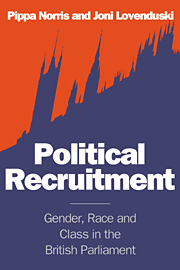Book contents
- Frontmatter
- Contents
- List of figures
- List of tables
- Preface
- 1 Puzzles in political recruitment
- Who selects and how?
- Who gets selected, and why?
- 6 Supply and demand explanations
- 7 Gatekeeper attitudes
- 8 Candidate resources
- 9 Candidate motivation
- 10 Comparative candidate recruitment
- Does the social bias matter?
- Appendix A Details of the survey design and sample
- Appendix B Questionnaires
- Notes
- Bibliography
- Index
8 - Candidate resources
Published online by Cambridge University Press: 07 December 2009
- Frontmatter
- Contents
- List of figures
- List of tables
- Preface
- 1 Puzzles in political recruitment
- Who selects and how?
- Who gets selected, and why?
- 6 Supply and demand explanations
- 7 Gatekeeper attitudes
- 8 Candidate resources
- 9 Candidate motivation
- 10 Comparative candidate recruitment
- Does the social bias matter?
- Appendix A Details of the survey design and sample
- Appendix B Questionnaires
- Notes
- Bibliography
- Index
Summary
This chapter compares the resources of actors on the ladder of recruitment. ‘Resources’ are understood as a range of assets which can be employed to advantage in pursuing a political career. This includes personal income, union sponsorship, time, political experience, and support networks. In the analytical model, outlined in figure 8.1, it is a combination of resources plus motivation which form the necessary and sufficient conditions for seeking a parliamentary seat. Many people have the time and money to run for office, but without commitment they will not use these resources for political objectives. Others may have nursed a long-standing ambition to be in Westminster, but without the experience or contacts they may never succeed. Resources could be expected to influence either the supply or demand-side of the candidate selection process, or both.
On the supply-side, resources may place aspirants in a stronger position to pursue a political career, should they aspire to Westminster. Studies of mass political participation have commonly found individual and group-based resources to be strongly associated with different forms of activism, in political parties, interest and community groups. Resources may influence which party members enter the pool of applicants. The impact of certain resources like household income can be tested in the most straightforward way, by comparing the characteristics of members and applicants, as in the previous chapters. With some other resources, information about party members is not available, or is simply inappropriate, since certain questions about recruitment can only be asked of the political elite.
- Type
- Chapter
- Information
- Political RecruitmentGender, Race and Class in the British Parliament, pp. 143 - 165Publisher: Cambridge University PressPrint publication year: 1994

